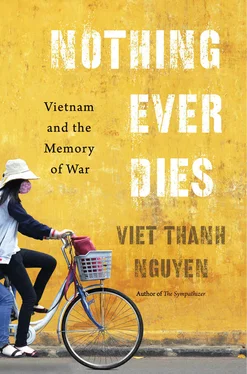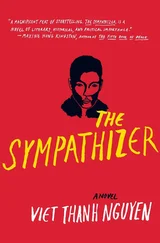Telling on others and ourselves is perilous, not least of all for the artists who confront the victimization that would silence them and the lure of having a voice that promises to liberate them. Claiming a voice — that is to say, speaking up and speaking out — are fundamental to the American character, or so Americans like to believe. The immigrant, the refugee, the exile, and the stranger who comes to these new shores may already have a voice, but usually it speaks in a different language than the American lingua franca, English. While those who live in what the scholar Werner Sollors calls a “multilingual America” speak and write many languages, America as a whole, the America that rules, prides itself on trenchant monolingualism. 10As a result, the immigrant, the refugee, the exile, and the stranger can be heard in high volume only in their own homes and in the enclaves they carve out for themselves. Outside those ethnic walls, facing an indifferent America, the other struggles to speak. She clears her throat, hesitates and, most often, waits for the next generation raised or born on American soil to speak for them. Vietnamese American literature written in English follows this ethnic cycle of silence to speech. In that way, Vietnamese American literature fulfills ethnic writing’s most basic function: to serve as proof that regardless of what brought these others to America, they or their children have become accepted, even if grudgingly, by other Americans. This move from silence to speech is the form of ethnic literature in America, the box that contains all sorts of troubling content. After all, what brought these so-called ethnics to America are usually difficult experiences, and more often than not terrible and traumatizing ones.
We might say that the form or the box is ethnic, and its contents are racial. 11The ethnic is what America can assimilate, while the racial is what America cannot digest. In American mythology, one ethnic is the same, eventually, as any other ethnic: the Irish, the Chinese, the Mexican, and, eventually, hopefully, the black, who remains at the outer edge as the defining limit and the colored line of ethnic hope in America. But the racial continues to roil and disturb the American Dream, diverting the American Way from its road of progress. If form is ethnic and content is racial, then the box one opens in the hopes of finding something savory may yet contain that strange thing, foreign by way of sight and smell, which refuses to be consumed so easily: slavery, exploitation, and expropriation, as well as poverty, starvation, and persecution. In the case of Vietnamese American literature, the form has become aesthetically refined over the past fifty years, but the content — war — remains potentially troublesome and volatile. Race mattered in this war, but to what extent it mattered continues to cause disagreement among Americans and Vietnamese. One can draw a distinction here between the two faces of one country, the United States and America. If the United States is the reality and the infrastructure, then America is the mythology and the façade. Even the Vietnamese who fought against the Americans drew this line, appealing to the hearts and minds of the American people to oppose the policies of the United States and its un-American war. As for Americans, they, too, see this line, although what it means exactly is a subject of intense debate. Many Americans experienced and remember the war as an unjust, cruel one that betrayed the American character. Many other Americans view the war less as a betrayal and more as a failure of the American character. But the number of Americans who think the war expressed a fundamental flaw in the American character, as a gut-level expression of genocidal white supremacy, is a minority.
Vietnamese American literature is thus published in a country with no consensus on what to make of this war. Was the war a mistake and a failure? A noble but flawed endeavor, carried out with the best of intentions? The naked throbbing of the heart of darkness? 12If Vietnamese American literature could avoid the war, then it could avoid this challenge of confronting the mythology and the contradictions of America. But the literature cannot avoid the war, because the literature is inseparable from the Vietnamese American population itself, which exists only because of the war. For the Vietnamese American writer as a racially bound ethnic writer, the necessity of speaking up, speaking out, and speaking for remains tied to the name of the ethnic population. As much as this person might want to forget his or her racial past, America will not let this ethnic other forget. This is the history that critic Isabelle Thuy Pelaud speaks of when she characterizes Vietnamese American literature as being located between the poles of history and hybridity. 13America promises hybridity to its newcomers, the dream of becoming something different on American soil. But Americans cannot awaken from this war’s history, which Americans continue to evoke whenever the United States again ventures abroad. 14
Each racially defined ethnic group in the United States gets its own notable history for which it is remembered by Americans. Blacks get slavery and the plantation, and the legacies they leave in blackness and the ghetto. Latinos are of the Americas but are neither North American nor white (at least the Latinos that come first to the American mind), their lives supposedly marked by barrios and the border. Native Americans get genocide, dispossession, and the reservation. Vietnamese Americans get the war. Any ethnically defined literature is bound up with that ethnic group’s history in America because so-called ethnic literatures are forms of memory, saturated by ethical problems around the remembering of selves and others. 15Again race is key. For ethnic groups that can shed racial difference, such as the Irish who were once depicted in American media as being inassimilable, or the Jews once seen as beyond the pale, ethnicity becomes, as the sociologist Mary Waters says, an option, a choice. 16Those ethnic groups that remain marked, or stained, by race, have choices, too, but they also have no control about how others thrust their ethnicity on them. The choices made by racially defined people always conflict with the hard expectations of other Americans, which is also a reality of the literary world. There, the box of form assumes the name of the ethnic group, such as Vietnamese American literature. In contrast, Irish American literature or Jewish American literature has less visibility, with John O’Hara, Mary McCarthy, Saul Bellow, and Philip Roth being American writers first and ethnic writers second, if at all. They have the choice to be white that racial minorities do not.
Minority writers know they are most easily heard in America when they speak about the historical events that defined their populations. These writers can speak of something else, but they are rewarded for speaking about their history and their race. For some, the history of their racial difference instills in them the desire to speak about their past. Nam Le captures the dynamic of silence and speech in his story “Love and Honor and Pity and Pride and Compassion and Sacrifice.” 17A writer named Nam is studying at the fabled University of Iowa writing program. He does not want to write about Vietnamese experiences, but when his father visits, he decides to write the ethnic story, based on his father’s harrowing war experience. The father survived a massacre, and not just any massacre, but the most horrible event of the war for the American conscience — the My Lai massacre. Nam knows he can make a literary reputation for himself out of this story, but when he proudly shows it to his father, his father burns the manuscript. Ironically, this story brought Nam Le to visibility. Writing the ethnic story made his name in the literary scene, and yet the lure of history and race trouble both he and his character Nam. If the literary world allows ethnic authors inside, even if only to one corner, then surely this proves that the larger world also accommodates them and the people they speak of and for. This is perhaps the most troubling tension running throughout Vietnamese American literature. On the one hand, when the literature speaks of the war and the harm done to the Vietnamese, the Vietnamese are victims. On the other hand, the existence of the literature seems to prove that America ultimately fulfilled its promise of freedom, giving the Vietnamese a voice. These problematic scenarios of being a victim or having a voice place the ethnic author into an impossible situation.
Читать дальше












